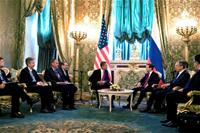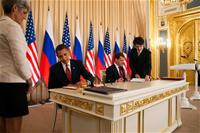David Kramer: the visit of Obama to Moscow was a success
Adelina Marini, July 9, 2009
 We have quite enough internal problems and, probably, this is the reason why we do not pay much attention to what's happening globally. And it is important! It is important because when the big countries talk, this would have an impact on the small ones, especially for countries like Bulgaria which for the last 4 years were put in very disadvantageous position - either to be a strategic partner of the US or to create pragmatic relations with Russia. The is why euinside offers you the analysis of the visit of Barack Obama to Moscow of David Kramer, a senior transatlantic fellow at the German Marshall Fund of the United States in Washington, D.C., and former assistant secretary of state for democracy, human rights, and labor and deputy assistant secretary for Russia, Ukraine, Belarus, and Georgia. We publish his analysis with some abridgments.
We have quite enough internal problems and, probably, this is the reason why we do not pay much attention to what's happening globally. And it is important! It is important because when the big countries talk, this would have an impact on the small ones, especially for countries like Bulgaria which for the last 4 years were put in very disadvantageous position - either to be a strategic partner of the US or to create pragmatic relations with Russia. The is why euinside offers you the analysis of the visit of Barack Obama to Moscow of David Kramer, a senior transatlantic fellow at the German Marshall Fund of the United States in Washington, D.C., and former assistant secretary of state for democracy, human rights, and labor and deputy assistant secretary for Russia, Ukraine, Belarus, and Georgia. We publish his analysis with some abridgments.
"Barack Obama deserves credit for his efforts to reset relations with Russia over the past two days in Moscow. The U.S. president succeeded, at least for now, in changing the tone of the U.S.-Russia relationship, even on issues of disagreement, though many fundamental disputes -- Georgia, Iran, missile defense -- remain. Ultimately, Obama's major success in the past few days was less in the agreements he signed but in the statements he made, the signals he sent, and the broad group of people he met.
Although Obama's first-day meeting with Russian President Dmitry Medvedev produced eight  different joint statements or agreements, it was Obama's second day in Moscow that was more important -- and not just because that is when he met with Prime Minister Vladimir Putin, still Russia's most influential political figure. No, the second day was more important because of the other people with whom Obama met: Russian civil society representatives, opposition leaders, and students at the New Economic School (NES). In sitting down with staunch Kremlin critics, including Garry Kasparov and Boris Nemtsov, and civil society activists, including noted human rights defender Lyudmila Alexeyeva, Obama underscored his interest in resetting relations not just with the Russian government but with the Russian people and society (underlines by euinside).
different joint statements or agreements, it was Obama's second day in Moscow that was more important -- and not just because that is when he met with Prime Minister Vladimir Putin, still Russia's most influential political figure. No, the second day was more important because of the other people with whom Obama met: Russian civil society representatives, opposition leaders, and students at the New Economic School (NES). In sitting down with staunch Kremlin critics, including Garry Kasparov and Boris Nemtsov, and civil society activists, including noted human rights defender Lyudmila Alexeyeva, Obama underscored his interest in resetting relations not just with the Russian government but with the Russian people and society (underlines by euinside).
Storm clouds still hang over U.S-Russian relations, and one visit from Obama will not erase them. But his visit did provide a few rays of sunshine, particularly his effort to reach beyond the Kremlin to connect with Russia's people. Obama's challenge now as he leaves Moscow: Make sure those remaining dark clouds don't lead to a flood of new problems", ends the article of Mr. David Kramer who wrote it for the Foreign Policy magazine.